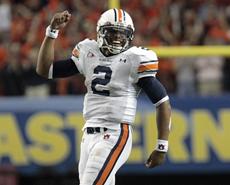
AP-Cam Newton was ruled eligible last season despite the NCAA finding his father Cecil to be involved in pay-for-play scheme.
The NCAA announced on July 26 that it would begin a review process that would expand the NCAA’s definition of an agent to include relatives, including parents.
While the NCAA Division I Amateurism Cabinet came up with the idea to close a loophole that kept Auburn quarterback Cam Newton eligible through the end of last season despite discovering his father, Cecil, was involved in a pay-for-play scheme, it appears to be more of an excuse to retract a precedent they clearly set by allowing Newton to play.
The NCAA set a precedent last year by allowing Newton to play: as long as the athlete put on the ear muffs and looked away, he could be shopped around like a prized possession at an auction by Tiffany’s.
And to make up for a major mistake by calling their decision a “loophole” is not only wrong, but offensive. Because of a blatant error and lapse in judgment involving Newton, other prospective athletes have to face the scrutiny of officials considering their own parents as agents.
Classifying parents as agents is not only controversial, but humanely wrong on so many levels. When you do this, you are implying that every parent is shopping their son/daughter around. That is clearly not the case, and should never be an assumption that is made. It is within the best interest of the prospective athlete, never the parent.
What makes matters worse is that the NCAA refuses to admit they made a mistake in the ruling of Cam Newton’s eligibility, and covering it up by calling their decision a “loophole” in the process.
The ruling set a precedent that could not be undone, but for the NCAA, covering up and hiding from your problems seems to be the natural solution.
Cecil Newton acted as an agent in every sense of the word. He asked Mississippi State for six-figure money if they expected Cam Newton to play in Starkville.
What should be taken into consideration is how they handled the case, and allowed Newton to continue playing.
According to the SEC bylaw 14.01.3.2: “If at any time before or after matriculation in a member institution a student-athlete or any member of his/her family receives or agrees to receive, directly or indirectly, any aid or assistance beyond or in addition to that permitted by the Bylaws of this Conference (except such aid or assistance as such student-athlete may receive from those persons on whom the student is naturally or legally dependent for support), such student-athlete shall be ineligible for competition in any intercollegiate sport within the Conference for the remainder of his/her college career.”
But he continued to play because the NCAA ruled Newton did not know of his father’s endeavors. Instead of reversing the decision and admitting wrongdoing, the NCAA feels compelled to cover up another cover up to cover it up some more: playing footsie with classifying relatives as agents to cover up a “loophole” as they deem it.
This isn’t expanding the definition of an agent: the SEC bylaw clearly states what an agent is. But leave it up to the NCAA to put the blame on somebody else but themselves for ignoring a clear rules violation.
The NCAA made it a “loophole.” If they had any intention on ruling Cam Newton ineligible, they would have. Instead, Newton led the Tigers to a National Championship and is now making millions in the NFL.
How’s that for a pay-for-play scheme?
